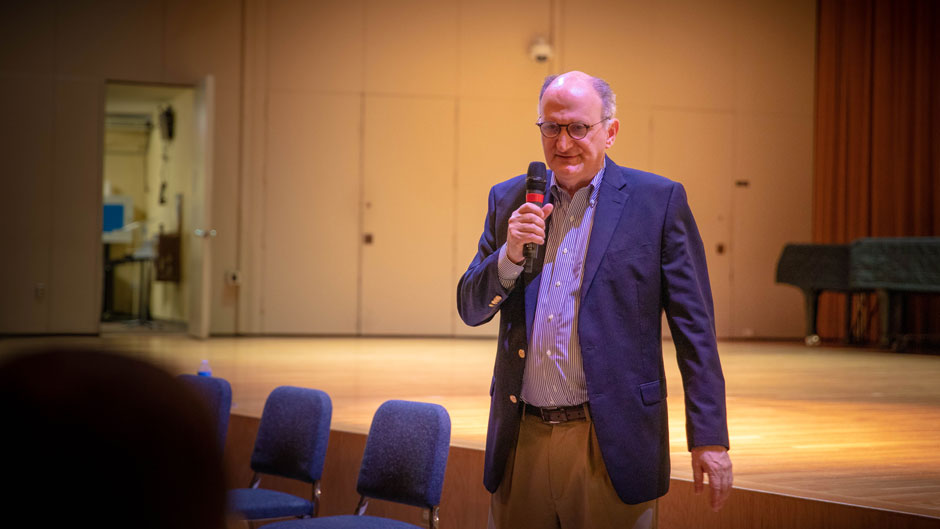With an annual budget of $100 million and assets worth $600 million, the Boston Symphony Orchestra (BSO) is the largest orchestral enterprise in the world, employing more than 200 musicians and 1,200 full- and part-time employees.
Its long-serving managing director, Mark Volpe, spoke with students at the University of Miami’s Frost School of Music about the BSO’s storied past, ambitious plans for the future, and the orchestra world at large. Frost School Dean Shelly Berg met Volpe two years ago at the Tanglewood Music Center, the BSO’s summer home in the Berkshire Mountains in Massachusetts.
“Your future will be very different than mine,” Volpe said to about 100 undergraduate and graduate music students who were gathered in the Maurice Gusman Concert Hall on UM’s Coral Gables campus. Volpe was a clarinet major in college and performed as an extra musician in the St. Paul Chamber Orchestra before earning a law degree. He entered the orchestra management business in 1983 after concluding that practicing law would preclude him from his true passion, music.
Volpe said the classical musician’s job description today is much broader than in the past, and he praised students in the Frost School for their openness and preparedness.
“It requires more resilience, more tenacity,” he explained. “You may perform more in small groups, and in ensembles that do things differently. If you perform in a professional orchestra like ours, you will also advocate for music, talk to legislatures, help fundraise, teach privately and also in outreach programs in schools.”
He added there are very rewarding jobs in music that are beyond the orchestral stage. “Our organization employs many musicians in staff positions who are also actively playing in their own ensembles.”
Students got the opportunity to ask Volpe questions.
“What helped you make the transition to management?” asked clarinetist Jesse Gilday, a graduate student who is considering a career in performing arts management. “How did you do it?”
“Life’s about relationships. Take initiative; call and meet people who run major organizations and talk to them. They might hire you,” Volpe responded. “Unlike orchestra positions, where only two or three may open up each year, staff positions turn over faster. The BSO trains people to run orchestras, so other organizations routinely recruit our staff. Be a generalist at first, learn how an organization functions. If you know someone who can call or email to introduce you, that always helps.”
Cellist Shea Kole, a doctor of musical arts candidate, enjoyed Volpe’s candor and advice.
“I think Mr. Volpe showed us the potential benefits of being highly skilled in more than one field,” said Kole. “I think it’s good for musicians to pursue secondary interests for their own merit, or for career options which in his case was a law degree.”
Rosie Weiss, an undergraduate violin performance major, agreed. “At this particular time in my life, when I’m not entirely sure what direction to take my music career, I really appreciated Mr. Volpe sharing some of his wisdom with us. Being versatile and multifaceted seems to be the key to success these days, and he certainly reinforced this idea.”
“I grew up backstage,” said Volpe, whose father was a professional orchestra musician. “It’s a real emotional thing for me, I’m around the orchestra constantly.”
As for his role now, Volpe said, “I have to make intelligent decisions about operations, legal matters, real estate, programming and so on. But as an orchestra manager, you have to be there in both the good moments and the bad moments. If someone needs to vent [at me], that’s part of the job.
“This is not a rational business,” he reflected. “That’s one of the first things I tell new board members who want to apply their business acumen to improve our bottom line. We’re in it because we love music, and because it matters in the world.”

